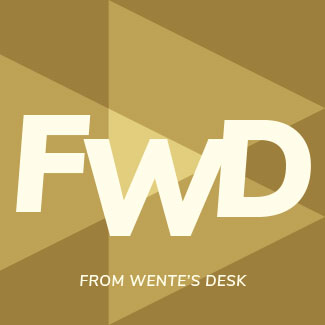Why I still believe

Last week, Wake Forest welcomed EGOT-winning artist John Legend as the final speaker in this year’s Face to Face series. Before the event, I had the opportunity to speak with him backstage. What struck me most wasn’t his fame or accomplishments but his steady, grounded optimism. When asked on stage whether he had a go-to song when he feels sad, Legend paused, chuckled, and said he rarely feels that way. “I’m blessed!” he added, noting the joy he finds in his family and his work.
His answer stayed with me because it reflected a perspective rooted in resilience and gratitude, not naïveté. It reminded me of a question I’m often asked:
“President Wente, how can you stay optimistic about the future of higher education?”
It’s a fair and poignant question, especially right now. Higher education faces immense headwinds: a shifting political climate, deep public skepticism, and funding challenges. The federal government’s actions to freeze or withdraw funding for research from universities has created instability and uncertainty. Indeed, these actions threaten partnerships forged over decades between higher education and our government – a collaboration that has kept the U.S. on the global forefront of research and discovery.
And if we commit to honesty in our assessment of the moment, we — higher education – haven’t always helped our own cause. Rising tuition costs, perceptions about limited accessibility, and sometimes intangible outcomes have left too many people questioning whether universities truly serve the public good.
So why do I still believe?
In part, I still believe because of my roots as a scientist. Science teaches us that we can discover what was thought impossible to understand. But it also requires resilience and innovation when experiments fail or the findings of experiments are completely unexpected. From such perseverance and discovery comes truth. This commitment to curiosity, critique, and constant iteration is something universities can model for the world, especially in uncertain times.
I also believe because I have seen – and personally experienced – that higher education can change the trajectory of a person’s life. I still believe that learning to evaluate evidence, being open to new ideas, empathizing with the perspectives of others, accepting complexity and grappling with it, admitting error, and pursuing truth matters.
But belief alone isn’t enough. We also need to act. At Wake Forest, we are pushing forward with a clear-eyed commitment to strengthen our relevance and impact — to prove our public good:
- We are investing in research that tackles real-world problems—from climate resilience in Latin American forests, to the biology of chronic malaria, to ethical questions around honesty and character.
- We are involving undergraduates in faculty research early and often, ensuring they don’t just learn but help create knowledge.
- We are challenging ourselves to remove barriers to access, expand support for first-generation students and make belonging more than a buzzword.
I don’t claim to have all the answers. Like many of you, I carry a mix of hope and concern each and every day. But I also walk across this campus and witness moments every day that ground me and remind me to be optimistic and hopeful: A student sharing the joy of a job offer. A staff member whose quiet work has national impact. A faculty member whose research, scholarship or creative work reshapes an entire field. These stories are more than anecdotes; they are proof of what’s possible when a university works as it should.
At the end of his talk, John Legend told the audience that universities are a “sacred and critical part of what makes the United States a leader in the world.” He’s right! But sacredness isn’t a shield—it’s a responsibility. And if we want to defend higher education, we must demonstrate our value clearly, tangibly, and with humility.
So yes, I’m still an optimist. But it’s not a blind optimism. It’s optimism grounded in real work and real outcomes, shared purpose, and the deep belief in the excellence and value of higher education for the public good.
Categories: From Wente's Desk
